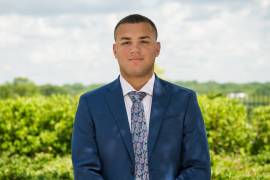
In My Own Words: "Why I’m Challenging the Dallas Arboretum"
Blog Search
By Jay Doe
Coming out to friends and family is one thing, but coming out in your career? That brings its own special challenges. For many years, I worked in organizations where I never felt safe to share my sexual orientation or express my gender more authentically. However, a few years ago when I moved to Dallas and began working at the Arboretum, I decided it was time to take the leap. For the first time I had an openly LGBTQ+ coworker and my first gay manager. After getting to know my colleagues, I made the decision to come out for the first time in a workplace. The amount of support and love I received from my peers at the time made me feel like I was finally safe to be my full self in my career.
Later, I was promoted to manage my own department. I knew this was an opportunity to build the diverse and inclusive workplace I had dreamed of in my early career. From hiring to programming, I made IDEA (Inclusion, Diversity, Equity and Accessibility) a priority in my decisions. While I was incredibly proud of our department’s work, almost immediately we began to hit roadblocks.
One of our first goals was creating diverse representation in our programming, such as celebrating Heritage Months and including transgender, nonbinary and genderqueer STEM professionals in our lessons. However, when I presented the idea of LGBTQ+ inclusion in programming, I was told by my supervisor that we could not promote or market queer representation. In a moment of vulnerability, I finally shared with my supervisor that while I was assigned female at birth, I am actually genderfluid. Adding representation in our programming wasn’t just a public ploy, it was personal.
While drying my tears, I listened to her tell me that she personally supports the LGBTQ+ community, but the Arboretum can’t force it on the public. It would be like a vegetarian or vegan making others follow their dietary choices. Hearing a leader I trusted compare my identity to a choice was at that moment the lowest point of my career.
However, I knew we needed to press on. In an effort to create a safe and inclusive environment for my team members, I welcomed and supported staff wearing pronoun pins, sharing pronouns during introductions and adding them in email signatures. I received so much grateful feedback from nonbinary staff who were relieved to finally be in a workplace that respected their identity. Not only that, but I saw cisgender staff learning and becoming advocates for their genderqueer colleagues.
However, Arboretum leadership quickly banned these practices when brought to their attention. First, email signatures were “standardized,” although the only change I noticed was the removal of pronouns. Quotes, sayings, and Bible verses remained. Then, pronoun pins and pronoun introductions were banned, and I was told that the Arboretum is a “conservative” institution and employees couldn’t do anything that appeared to “support an agenda.” A donor had recently seen an employee wearing a pronoun pin and called HR threatening to pull their support, and we needed to be careful about how we are viewed by our funders. At this final meeting with my new supervisor and the head of HR, I ultimately hit rock bottom. I shared with them my struggles, my feelings, and how these changes were like asking me to go back in the closet. Never had I been so honest and vulnerable in a workplace before.
The next day at work I was handed my termination letter.
The months that followed were some of the hardest in my life. I kept in touch with many of my former employees who shared their dismay with the changes banning the recognition of their identities. Terrified of losing their jobs as well, they removed their pins and started hiding anything that identified them as LGBTQ+. Almost everyone I hired during my tenure, especially those who are people of the global majority or LGBTQ+, left within the next few months, citing how unsafe and disrespected they felt. My heart broke every time I heard their stories and knew I couldn’t be there to protect them.
It’s been several months now, and I am incredibly grateful to have a new job at an organization that is supportive of me as a queer person and in my work as an IDEA advocate. But the damage is done. I’m still fearful every time I mention having a wife for the first time to a new employee. My heart quickens when I correct a colleague about pronouns. And while I know the scars of this trauma may fade over time, I hope the memory never leaves me, because this is what is motivating me to action.
I have filed a Discrimination Charge with the EEOC against the Dallas Arboretum. No one should suffer the indignity of discrimination because of who they are. This is especially true of the Arboretum, which receives public funds. Prior to the time the Arboretum discriminated against me, the citizens of Dallas had voted overwhelmingly for an amendment to the city charter to prohibit discrimination in the workplace (housing and public accommodations, too) on the basis of sexual orientation and gender identity and expression. Moreover, the Arboretum had signed a contract with the City agreeing not to discriminate against its employees.
My goal is to use my experience as a catalyst for the Arboretum to become more inclusive and accepting of its employees and of the backgrounds and identities of its visitors. I believe that people have an immense capacity for empathy when they actually learn more about others. Through LGBTQ+ inclusive policies and trainings, I hope that the Arboretum’s leadership can implement changes that will create a fair and equitable workplace for LGBTQ+ people and those living at the intersection of race or disability status.




